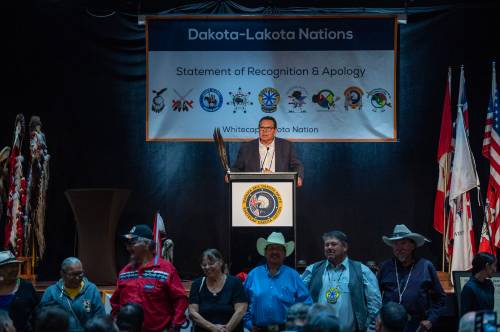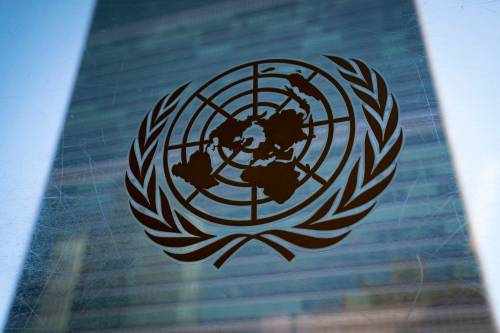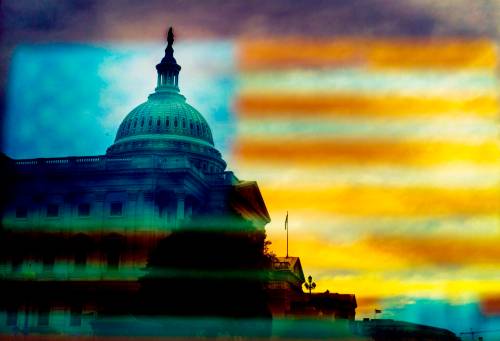Columns
6 minute read Monday, Nov. 17, 2025
In the sports documentary miniseries The Last Dance, Michael Jordan describes how, as a young rookie, he was confronted with an invitation to take part in illicit activities with teammates, including drugs and gambling.
He “did not go through that door,” realizing “he was in the NBA to get better.” Nowadays that kind of moral compass feels increasingly rare.
The recent gambling and fraud scandal rocking the NBA, for example, illustrates how, when sport leaders compromise on sport values — respect, excellence, safety and fairness — they compromise the value of sport to individuals and society as a whole.
The purpose of sport is individual and community development. The word “compete” is derived from the Latin competere which means to strive (for excellence) together.
Advertisement
Weather
Brandon MB
-5°C, Blowing snow
Liberals’ bail reforms won’t mean much
5 minute read Saturday, Oct. 18, 2025When the federal Liberal government unveils its latest round of bail law changes next week, you can bet on two things.
First, the government will tout them as bold new measures to make communities safer. And second, before the ink is dry, there will be fresh outrage when another accused offender released on bail commits a violent crime. It’s pretty much a guarantee.
The outcry will come, as it always does, regardless of government’s tinkering around the edges.
Granted, the public is frustrated. But here’s the reality: these latest bail law reforms will do little, if anything, to reduce crime or prevent repeat offending.
How should we move forward?
5 minute read Preview Saturday, Jul. 19, 2025AI ‘slop’ and the end of the internet
5 minute read Preview Monday, Jul. 14, 2025UN committee rightly calls out Canada’s devaluing of disability
4 minute read Preview Tuesday, Jun. 10, 2025The age of American leadership has been completely swept away
5 minute read Preview Wednesday, Jun. 4, 2025Trump’s pharma pricing order could have big effect in Canada
4 minute read Preview Tuesday, Jun. 3, 2025Cuts affect choices for international students
6 minute read Tuesday, May. 20, 2025With Advanced Placement (AP) exams just finishing, high school students in Brandon and around the world are nearing the end of their university-level courses.
The AP program first started in the United States during the Cold War as an academic program for high-achieving, typically wealthy, white students who demonstrated readiness for university-level work. The U.S. feared that high schools were not adequately preparing their students for university or post-graduate studies. Over the years, the program has expanded to numerous countries and has become more inclusive with a focus on equity and diversity.
On March 20, U.S. President Donald Trump signed an executive order directing Education Secretary Linda McMahon to begin dismantling the Department of Education. This has since been followed by further cuts to higher education and research. As students both local and international are preparing for the summer, beginning post-secondary plans or eagerly waiting for graduation, these developments south of the border are something to consider as impacting future plans.
The decision to dismantle the Department of Education will greatly affect low-income students, students of colour, students with disabilities and students from rural areas with less funding. Trump states on the White House website that taking out the Department of Education will drastically improve program implementation in higher education. By closing the Department of Education and returning authority to the states, he hopes to help “children and their families to escape a system that is failing them.” He says that the American education system through federal programs has failed their children, teachers, and families.
Vancouver SUV attack exposes crowd management falldowns
5 minute read Preview Monday, Apr. 28, 2025Bogus pretext for the Trump tariffs
4 minute read Preview Thursday, Mar. 20, 2025Feds must explain Métis commitment
7 minute read Preview Saturday, Dec. 14, 2024Vigilantism can’t achieve what activism can
4 minute read Saturday, Dec. 14, 2024Luigi Mangione is in some circles being celebrated as a modern-day Robin Hood.
The 26-year-old stands accused in the slaying of UnitedHealthcare CEO Brian Thompson in New York last week. Following news that Thompson had been gunned down moments before he was to attend a board meeting, social media erupted with postings of unbridled glee. Someone who was the face of an industry known for making despicable decisions that affect people’s lives had been taken out. Justice at long last.
Except, it’s not, of course. It’s not justice in any sense of the word.
There’s little doubt the health-care system in the United States creates unnecessary stress. The No. 1 reason for declaring bankruptcy in the U.S. is health-related debt. According to some studies, nearly one in five U.S. health-care claims is initially rejected by health-care companies.
Skip the alcohol this Christmas
4 minute read Preview Tuesday, Dec. 10, 2024Old choices explain today’s housing crisis
5 minute read Friday, Nov. 1, 2024Housing is an important political issue. Politicians and experts now talk about it as a major crisis that could threaten our economic and social well-being. But this is nothing new. Another housing crisis raged at the beginning of the 20th century.
Back then, it concerned working-class slums. Today, it’s much more widespread: many households are struggling to acquire property, while others are spending too much of their income on rent, and still others are living in substandard housing, or simply have nowhere to live.
As a specialist in the history of urban planning and a full professor at the Université de Montréal’s School of Urban Planning and Landscape Architecture, I hear arguments today that are similar to those made 120 years ago, although there are new elements now.
The promise of decent housing
Mental health can’t be ignored during work injury recovery
5 minute read Thursday, Jul. 18, 2024Discussions about mental health in the workplace have surged lately, driven by growing awareness of its impact on employee and organizational success. As occupational health researchers, these discussions have helped us shed light on the precursors and consequences of mental health challenges.
One such critical but often overlooked aspect is the relationship between mental health challenges and work injuries — a relationship that goes in both directions: struggling with mental health can increase the risk of work injuries, and work injuries can give rise to, or worsen, mental health challenges.
We aimed to shed light on this crucial bidirectional relationship because it undermines the sustainability of an organization’s most crucial asset: its people.
Mental health and work injuries
Quarantining populism is worth a shot
7 minute read Preview Wednesday, Apr. 10, 2024LOAD MORE











